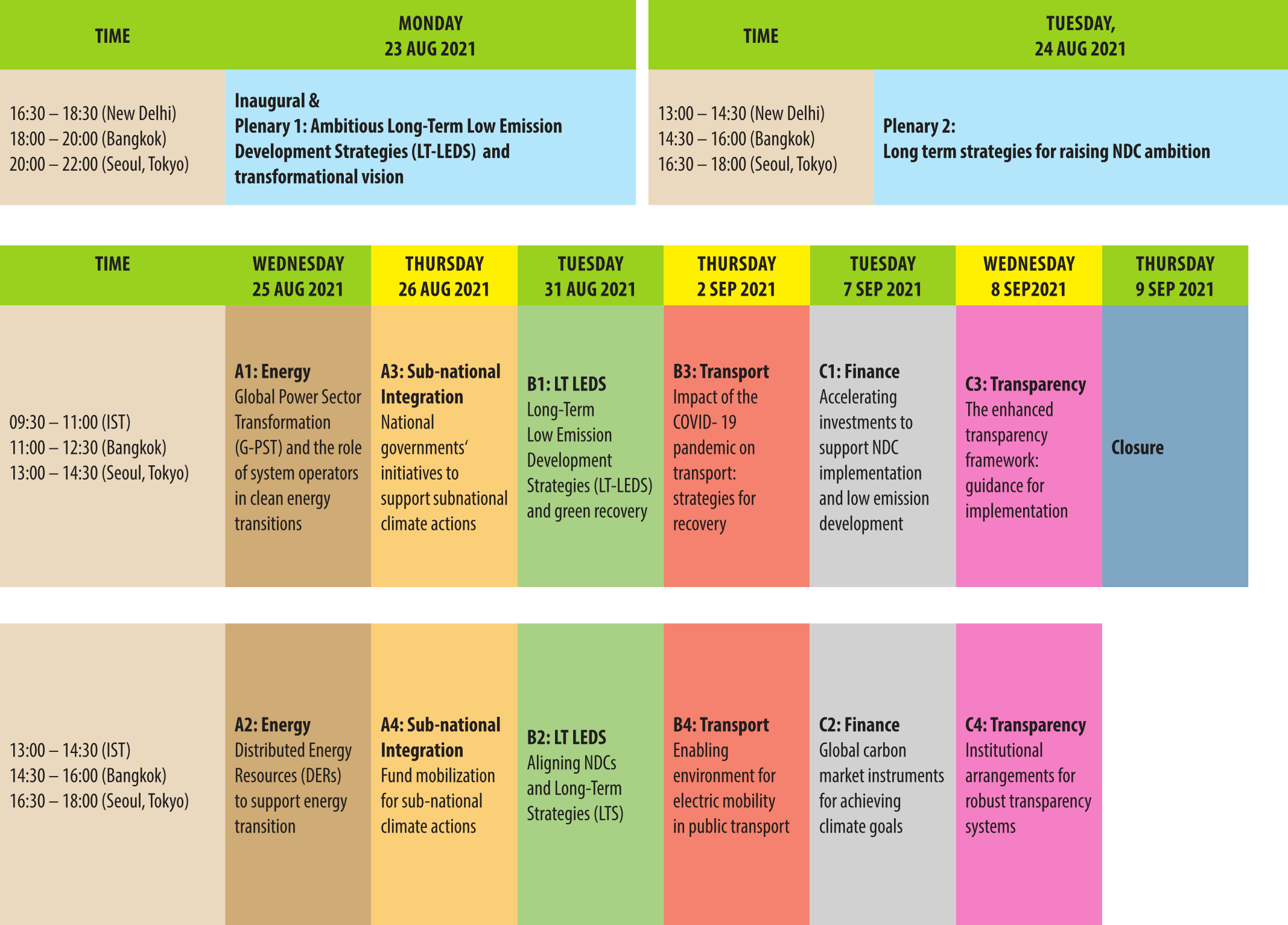
News
Join the discussion on LT-LEDS at the Asia LEDS Forum 2021
It is time for the Asia LEDS Forum again! The Asia LEDS Forum serves as the premier gathering of policymakers, donors, practitioners, and other experts involved in enabling low-emission, climate-resilient development in Asia. It explores synergies and collaboration opportunities to advance climate change goals. Further, the Forum supports peer to peer learning, knowledge sharing, exploring collaboration opportunities and to identify the priority needs of Asian countries.
Asia LEDS Forum goes virtual
This year for the first time, the Asia LEDS Forum will be organized virtually. It comes at a time where countries are making economic recovery efforts. It is imperative that the recovery efforts are to be in aligned with long term strategies and the climate change goals.
The Forum’s organizer is the Asia LEDS Partnership (ALP) who is supporting developing countries to advance implementation and raise ambition of Nationally Determined Contributions (NDCs) and Long-Term Low Emission Development Strategies (LT-LEDS). With support from experts andorganizations, ALP is devising hands-on trainings on tools, methodologies, implementation frameworks and success stories from the region. It works through Communities of Practice on Grid Renewable Energy, Clean Mobility, NDC Finance, and Sub-National Integration.
The Asia LEDS Forum 2021 is a steppingstone for moving forward with all these initiatives. The 3 week Forum will cover various thematic topics. It will bring together country representatives, technical experts and development organisations. All the participants will join in identifying areas of collaboration and creating opportunities for peer learning, knowledge sharing and in-depth trainings to support the implementation of NDCs and LT-LEDS.

The Asia LEDS Forum 2021 seeks to:
- Provide examples of innovative cutting- edge solutions that have helped countries to raise their NDC ambitions and transition their economies
- Provide a platform for countries to share their learnings and experience in formulating ambitious policies and plans and their assessment of the benefits of these transformative actions.
- Enable knowledge sharing of tools and methodologies and in-depth trainings on instruments to advance implementation and raise NDC and LEDS ambitions
Join the Asia LEDS Forum 2021!
We want to invite all readers to participate in the Asia LEDS Forum 2021! In order to do so, please register here. You will not only be able to attend the live sessions. The Forum also provides you a platform to exchange and network with colleagues from all over Asia and indeed the world. What’s more, you can explore the different virtual booths, including the LEDS Global Partnership’s one.
At the first event day, high-level representatives from ALP, the LEDS Global Partnership, UNFCCC, UN ESCAP, ICCCAD, Cambodia, Mongolia, Nepal, Vietnam, Germany, and the US, will discuss the importance of ambitious LT-LEDS. On the second day, the second plenary will discuss long term strategies for raising NDC ambition, with high-level representatives from the RCC Bangkok, Fiji, Indonesia, Japan, the Republic of Korea, and the Marshall Islands. The following event days will focus on one thematic topic each including energy, subnational integration, LT-LEDS, transport, finance, and transparency. LEDS GP’s co-host organization NREL will participate in the energy panel. Our Transport Working Group will provide interesting inputs to the discussion at the transport day. One session within the finance day will be supported by the colleagues from the Global Carbon Market project at the GIZ. Finally, the transparency event day will be co-hosted by our colleagues from the Partnership on Transparency in the Paris Agreement (PATPA). Find the full agenda here! If you want to attend individual events, please find the meeting links in this document.
Beyond the Asia LEDS Forum, the outcomes of each of the sessions will help in evaluating the activities in each of the Communities of Practice and allow for better trainings for the participants. Some follow-up trainings are already envisaged under the NDC Finance Community of Practice and the Sub-National Integration Community of Practice.
What is at stake?
To have a likely chance of limiting global warming to 1.5 degrees Celsius, climate scientists have estimated that global greenhouse gas emissions must be cut 45% by 2030 and reach net-zero soon after 2050. The 2015 Paris Agreement on Climate Change establishes the long-term goal of keeping global temperature increases to well below 2 degrees Celsius above pre-industrial levels (and aiming for 1.5 degrees Celsius) to avoid the worst impacts of climate change. Thus, the ambitious objective of the Paris Agreement requires that countries be more ambitious and adapt a more long-term vision than what five-year NDC cycles might imply. To do so, countries may need to step back from individual NDCs and envision a more integrated approach of long-term climate-resilient and sustainable development. This requires a profound shift in the development paradigms, which will call for new and innovative pathways to both resilient and carbon neutral societies.
So far, five in-person Asia LEDS Forums have been organized between 2012 and 2017 in Thailand, the Philippines, Indonesia, and Vietnam, hosted by respective country governments. Prominent organizations participating in the Forums include the World Bank, ADB, UNFCCC, OECD, and many more. Around 250 participants from different backgrounds have attended each of the previous forums in average.

Organizations that will participate in this year’s edition of the Asia LEDS Forum:
- 2050 Pathways Platform
- Abt Associates
- AIIB
- Asia LEDS Partnership
- Asian Development Bank (ADB)
- Asian Institute of Technology
- Bangladesh
- Cambodia, Ministry of Environment
- Cities Climate Finance Leadership Alliance (CCFLA)
- Clean Air Asia
- Deutsche Gesellschaft für Internationale Zusammenarbeit (GIZ)
- FAO
- Fiji, Ministry of Economy
- Financing Energy for Low-carbon Investment Cities Advisory Facility (FELICITY), GIZ Indonesia
- Germany, Federal Ministry for the Environment, Nature Conservation and Nuclear Safety (BMU)
- GGGI
- Global Carbon Markets Programme, GIZ
- Global Power System Transformation Consortium (G-PST) Consortium
- Hawaii Natural Energy Institute (HNEI)
- ICCCAD
- ICF
- ICLEI – South Asia
- ICLEI World Secretariat
- India, Ministry of New and Renewable Energy
- Indonesia
- Initiative for Climate Action Transparency (ICAT)
- International Finance Corporation (IFC)
- Japan
- Korea Environment Corporation (Keco)
- LEDS GP
- Malaysia
- Marshall Islands
- Mongolia, Ministry of Environment and Tourism
- National Renewable Energy Laboratory (NREL)
- NDC Partnership
- NDC TIA, GIZ
- Nepal, Ministry of Forests and Environment (MoFE)
- Partnership on Transparency in the Paris Agreement (PATPA)
- Philippines, Department of Energy (DOE)
- Ricardo E&E
- Singapore
- SLOCAT
- Solutions for Our Climate (SFOC)
- Sri Lanka, Ministry of Mahaweli Development and Environment
- Subnational Climate Finance Initiative (SCF)
- Thailand, Chiang Mai City Authority
- TUMIVolt, GIZ
- UN ESCAP
- UNDP
- UNEP DTU Partnership
- UNFCCC
- UNFCCC Regional Collaboration Centre (RCC) Bangkok
- US Department of State
- US Environmental Protection Agency (EPA)
- USAID
- Vietnam, Ministry of Natural Resources and Environment (MONRE)
- Vietnam, Ministry of Planning and Investment (MPI)
- World Bank
- World Resources Institute (WRI)
